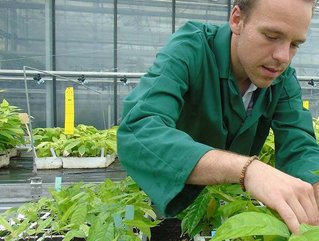How is Nestlé advancing production and raw material souring?

With ambitions to translate novel agricultural science into concrete applications and identify the most promising agricultural technologies, Nestlé has launched the Nestlé Institute of Agricultural Sciences.
So how will this new institute help Nestlé deliver on its net zero road map?
On a mission to achieve net zero and transition towards a regenerative food system, Nestlé recognises the importance of large scale changes in the way raw materials are produced and sourced.
Nestlé’s new institute will focus on plant science, dairy livestock, and agricultural systems science, and will assess and combine science-based solutions to improve the nutritional and sensorial qualities of raw materials, as well as their environmental impact.
Nestlé plans to work in close collaboration with internal and external partners on this project, such as academic institutions, research organisations, start-ups, industry partners, and farmers.
Those that are a part of the project will help with the assessment and development of science-based solutions, as well as adapting them for implementation and scale-up across Nestlé’s supply chain.
"Our transition towards a regenerative food system is enabled by agricultural science and new agricultural technologies. The new institute will accelerate the translation of science into concrete solutions that can be implemented at farm level, to support farmers globally in improving their environmental footprint, in reducing food and nutrient losses, and in better adapting to climate change while ensuring the quality of the raw materials they produce," said Stefan Palzer, Nestlé CTO.
Building on Nestlé’s existing work in agricultural science
Building on its existing work and expertise in agricultural science, Nestlé is already implementing important programs through the institute.
For example:
Plant science experts are contributing to Nestlé’s sustainable cocoa and coffe sourcing plans.
Nestlé experts are working to identify the most suitable pulses and grains for low carbon, plant-based alternatives to meat, seafood and dairy.
Nestlé’s instituted also plans to work with external partners to help to reduce emissions in dairy farming, develop regenerative agricultural practices, and improve biodiversity and soil health. In addition, new approaches will be explored to upcycle agricultural side streams to reduce the loss of nutrients and food waste along the value chain.
"The work in agricultural sciences will complement our broad expertise at Nestlé Research, ranging from food safety to health science, material science and packaging. We will leverage our scientific breadth to drive holistic approaches, contributing to concrete solutions and innovation applied throughout the value chain, including in products,” commented Isabelle Bureau-Franz, Head of Nestlé Research.
"At the institute we will screen a wide variety of science-based agricultural solutions and assess their potential for reducing the environmental footprint of key agricultural raw materials. Together with our research and industry partners we want to bring the most promising approaches and solutions to farmers and contribute to their transition to regenerative practices with scalable and impactful applications,” added Jeroen Dijkman, Head of the Institute of Agricultural Sciences.






